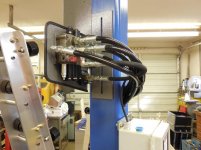ewlsey
Diamond
- Joined
- Jul 14, 2009
- Location
- Peoria, IL
Is there such a thing as a hydraulic fitting that doesn't leak at all? I've worked on equipment with every kind of fitting in existence, double flare, single flare, o-ring, tapered thread, yore-lock, ferrule/compression, push-lock, hose clamp, barb, every style of hose crimping, ad infinum. Every fitting I have ever seen has the trademark dirt/grease/oil stain around it within a relatively short time. A machine like a forklift or a backhoe is just a rolling hydraulic leak.
So, my stupid question is why do these fittings always leak at least a little bit? Is there any way to stop it?
So, my stupid question is why do these fittings always leak at least a little bit? Is there any way to stop it?



